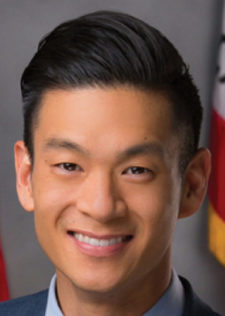California bill would let 17-year-olds vote in all elections
 California doesn’t have a particularly high opinion of the maturity of 18-year-olds, who can join the military but who can’t legally buy alcohol, tobacco, marijuana or firearms until they’re 21.
California doesn’t have a particularly high opinion of the maturity of 18-year-olds, who can join the military but who can’t legally buy alcohol, tobacco, marijuana or firearms until they’re 21.
But Assemblyman Evan Low (pictured), D-San Jose, wants to go in a different direction on voting. He has introduced Assembly Constitutional Amendment 8, which would lower the voting age from 18 to 17. First it needs to get two-thirds support in both the Assembly and the Senate, then approval of a majority of state voters.
Twenty-three states allow 17-year-olds to vote in primary elections if they will be 18 on the day of the general election. Assemblyman Kevin Mullin, D-San Mateo, has introduced Assembly Constitutional Amendment 4 to allow such voting in California.
But according to a San Francisco Chronicle analysis, no state allows voting at age 17 in general elections.
“Lowering the voting age will give a voice to young people and provide a tool to hold politicians accountable to the issues they care about. Young people are our future, and when we ignore that we do so at our own peril,” Low said in a statement provided to the Sacramento Bee.
Last year, Low’s similar proposal got 46 votes in the Senate – eight shy of the two-thirds threshold. He believes with Democrats now holding 61 of the Assembly’s 80 seats and 29 of the Senate’s 40 seats, his chances of making the ballot are much improved.
Republicans have been generally opposed to Low’s measure at least partly for partisan reasons. Polls in recent years have shown younger voters lean strongly to the left – to the point where a Gallup survey from last August found more of those aged 18 to 29 had a favorable view of socialism (51 percent) than capitalism (45 percent).
San Francisco nixed 2016 measure lowering voter age
But it’s not clear if Democrats will see the change as a way to gain a political advantage or are even enthusiastic about the idea. In May 2016, in San Francisco – where Democrats outnumber Republicans by 8 to 1 – the Board of Supervisors put Measure F on the November ballot, which would have lowered the voting age to 16 for local elections. But voters rejected it 52.1 percent to 47.9 percent, a 15,000-vote spread.
The debate over the measure likely foreshadowed the debate to come in the Legislature over Low’s bill.
Supporters said 16- and 17-year-olds were as capable as adults of making smart, informed election choices. They also said the voting change would promote awareness of civics at a time when polls show many young people are unfamiliar with basics about democracy.
Critics questioned why the measure had such a different view of young people’s maturity when it came to voting than with other adult privileges.
The close election may have been swung by a critical Chronicle editorial in September 2016.
“Young people must wait until the age of 21 to drink alcohol and, in California, smoke tobacco. They must wait until the age of 18 to serve their country,” the newspaper’s editorial board wrote. “It makes no sense for San Francisco to send the message that voting is a responsibility any less serious than these are.”
Chris Reed
Chris Reed is a regular contributor to Cal Watchdog. Reed is an editorial writer for U-T San Diego. Before joining the U-T in July 2005, he was the opinion-page columns editor and wrote the featured weekly Unspin column for The Orange County Register. Reed was on the national board of the Association of Opinion Page Editors from 2003-2005. From 2000 to 2005, Reed made more than 100 appearances as a featured news analyst on Los Angeles-area National Public Radio affiliate KPCC-FM. From 1990 to 1998, Reed was an editor, metro columnist and film critic at the Inland Valley Daily Bulletin in Ontario. Reed has a political science degree from the University of Hawaii (Hilo campus), where he edited the student newspaper, the Vulcan News, his senior year. He is on Twitter: @chrisreed99.
Related Articles
Investment Tax Credit Could Boost CA Jobs
MARCH 25, 2011 By KATY GRIMES One senator is trying to offer California manufacturers a break to help stimulate business
John Chiang Blazes Future of CA Politics
JUNE 27, 2011 By JOHN SEILER As they said in old-school physics, nature abhors a vacuum. Passed last November, Proposition 25
Public Employee Immunity Challenge
JULY 16, 2010 By KATY GRIMES Stacking the deck in favor of state employees, several bills currently working through the


